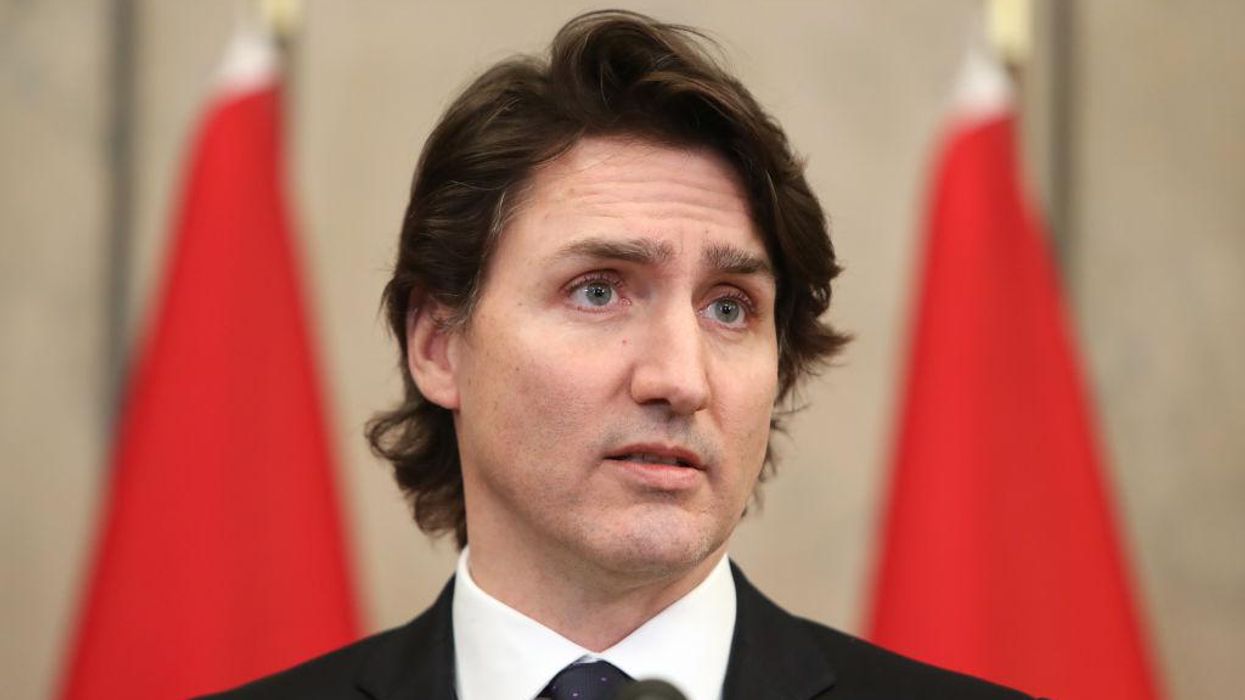
David Kawai/Bloomberg via Getty Images

Canadian Prime Minister Justin Trudeau on Monday invoked rare emergency powers to end the Freedom Convoy trucker protests against vaccine mandates.
In Canada's capital, Ottawa, hundreds of truckers have entered their third week of protest against the government's COVID-19 vaccine mandate, occupying the city's downtown area. Elsewhere, protesters have blocked border crossing between the U.S. and Canada, demanding that Trudeau lift the vaccine requirements on truckers that cross the border, as well as other coronavirus restrictions.
Canadian authorities said Sunday they had arrested several people and towed a pair of pickup trucks that had been parked to block an intersection leading to Ambassador Bridge, which connects Windsor, Ontario, to Detroit, Michigan. In the province of Alberta, police arrested 11 people near a border crossing and found a cache of firearms and ammunition.
"This is not a peaceful protest," Trudeau declared at a press conference.
The prime minister announced that he has invoked the 1988 Emergencies Act, a law that permits the federal government to override the provinces and suspend certain civil liberties to protect national security during an emergency. Trudeau's powers under the act would enable him to prohibit public assembly, travel, and to mobilize government support for local police, according to Reuters.
"With each of the illegal blockades, local law enforcement agencies have been acting to keep the peace within their jurisdiction. Despite their best efforts, it is now clear there are serious challenges to law enforcement's ability to effectively enforce the law," Trudeau said.
"After discussing with cabinet and caucus, after consultation with premiers from all provinces and territories, after speaking with opposition leaders, the federal government has invoked the Emergencies Act to supplement provincial and territorial capacity to address the blockades and occupations," he announced.
The Emergencies Act has never been invoked by a Canadian prime minister. A previous version of the law called the War Measures Act was used during peacetime by Trudeau's father, former Prime Minister Pierre Trudeau, who in 1970 used emergency powers to deal with a militant group of Quebec separatists who had kidnapped a British diplomat and then abducted a provincial cabinet minister who was later killed in captivity.
The law defines a national emergency as a temporary "urgent and critical situation" that "seriously endangers the lives, health or safety of Canadians and is of such proportions or nature as to exceed the capacity or authority of a province to deal with it."
"I want to be very clear, the scope of these measures will be time-limited, geographically targeted, as well as reasonable and proportionate to the threats they are meant to address," Trudeau said.
CBC/Radio-Canada, a publicly funded news outlet, reported that Emergency Preparedness Minister Bill Blair has been in "daily" discussions with Trudeau's cabinet on using on the government's emergency powers. Blair said the government was "prepared to do everything necessary" to end the protests.
At the press conference, Trudeau outlined how the Emergency Act will be used to "get the situation under control."
The prime minister said that police will be given greater powers to impose fines on or imprison the protesters in Ottawa and at points of entry between the U.S. and Canada, accusing the demonstrations of engaging in "illegal and dangerous activities." Trudeau said the government will designate border crossings and airports, among other places, as "critical" to the Canadian economy and will protect those areas.
He added that the government will be empowered to tow vehicles blocking roads and that financial institutions would be empowered to block funding for the protests and will not need a court order to do so.
Deputy Prime Minister Chrystia Freeland explained that any trucker that's using their vehicle in the "illegal blockades" will have their corporate accounts frozen and the insurance on their truck suspended.
"This is about keeping Canadians safe, protecting people's jobs, and restoring confidence in our institutions," Trudeau said.
The prime minister emphasized that the government will not call in the military to end the protests.
"We're not using the Emergencies Act to call in the military. We're not suspending fundamental rights or overriding the Charter of Rights and Freedoms. We are not limiting people's freedom of speech, we are not limiting freedom of peaceful assembly. We are not preventing people from exercising their right to protest legally. We are reinforcing the principles, values, and institutions that keep all Canadians free," Trudeau said.